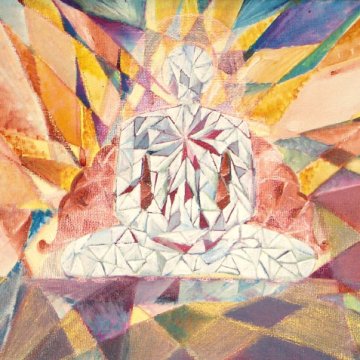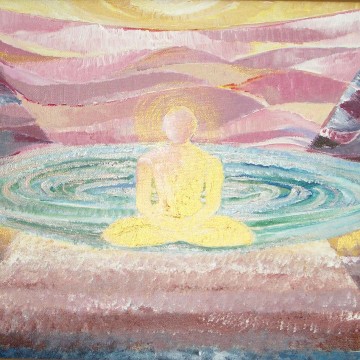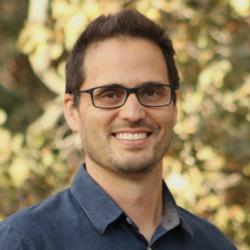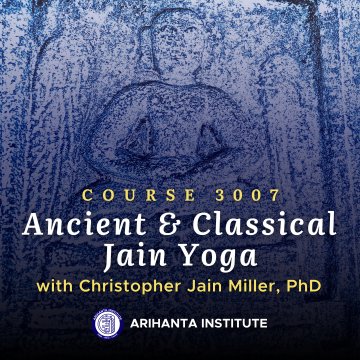Ancient and Classical Jain Yoga
Course Intro Video


Ancient and Classical Jain Yoga
Course 3007
This course provides an in-depth exploration of yoga and meditation as understood within ancient and classical Jain scriptures. In Part 1: Ancient Jain Yoga, students will be introduced to foundational concepts such as āsana, or physical postures, as a tool for purification and meditation. Drawing from early Jain texts, including the Uttarādhyayanasūtra and the Daśavaikālikasūtra, students will learn how restraint of the body, mind, and speech formed early Jain definitions of yoga.
Part 2: Yoga and Meditation in Classical Jain Philosophy, transitions into an examination of the Tattvārthsūtra and its commentaries, where yoga is described as the inflow (āsrava) of karma—representing an obstacle to spiritual liberation. Students will explore the key to liberation through correct worldview, knowledge, and conduct, as well as the role of dhyāna (meditation) as both an austerity (tapas) and a means of wearing away (nirjarā) karma. Through a discussion of virtuous (dharma) and pure (śukla) meditation, the course will highlight how advanced meditation practices lead to spiritual purification and the elimination of karma, providing a comprehensive understanding of Jain yoga's ultimate aim of mokṣa, or liberation.
This is designed as a two-week course that will take approximately 4 hours to complete, and includes readings and a series of 10 lectures to guide you through the intricacies of ancient and classical Jain definitions of Yoga.
Learning Objectives:
- Learn the role of āsana (physical postures) in ancient Jain yoga as a tool for purification and meditation.
- Discover how restraint of body, mind, and speech formed early Jain definitions of yoga, with guidance from key ancient texts.
- Explore the classical Jain philosophical view of yoga as the inflow (āsrava) of karma, and see how this concept is discussed in the Tattvārthsūtra and its commentaries.
- Understand how meditation (dhyāna) serves as an austerity (tapas) to wear away karma (nirjarā) and how virtuous (dharma) and pure (śukla) meditation practices lead to spiritual purification and liberation (mokṣa).
Course Length
4 hours Self-Study (Professor available by appointment in office hours)Learning Area
 Jain Philosophy, History & Anthropology
Jain Philosophy, History & Anthropology  Yoga, Self-care and Spirituality
Yoga, Self-care and Spirituality Instructor
 Christopher Miller, PhD
Christopher Miller, PhD
Christopher Jain Miller, the co-founder and Vice President of Academic Affairs at Arihanta Institute, completed his PhD in the Study of Religion at the University of California, Davis. He is Professor of Jain and Yoga Studies at Arihanta Institute, Visiting Researcher at the University of Zürich's Asien-Orient-Institut, and Adjunct Professor at Claremont School of Theology. Christopher's primary fields of research interest are Yoga Studies and Engaged Jain Studies, and he currently serves as the co-chair of the Yoga in Theory and Practice Unit at the American Academy of Religion as well as on the steering committees for the Dharma Academy of North America (DANAM) and the Yoga Darśana Yoga Sādhana conference. Christopher is the author of Embodying Transnational Yoga: Eating, Singing, and Breathing in Transformation (Routledge 2024) and the co-editor of Engaged Jainism: Critical and Constructive Studies of Jain Social Engagement (SUNY 2025) as well as Beacons of Dharma: Spiritual Exemplars for the Modern Age (Lexington 2020).
Enrollment Options
14-DAY FREE TRIAL
- Free, unlimited access to our self-paced courses for 14-days.
- Already used your free trial? Enroll in our Monthly or Annual Membership options at anytime and continue learning immediately!
MONTHLY MEMBERSHIP
- $45 USD / Month
-
Immediate access to course
#### | Name. - Unlimited access to our live and self-paced courses for one month, with month-to-month auto rollover.
- Excludes graduate seminars, language courses, and courses hosted on partner platforms.

